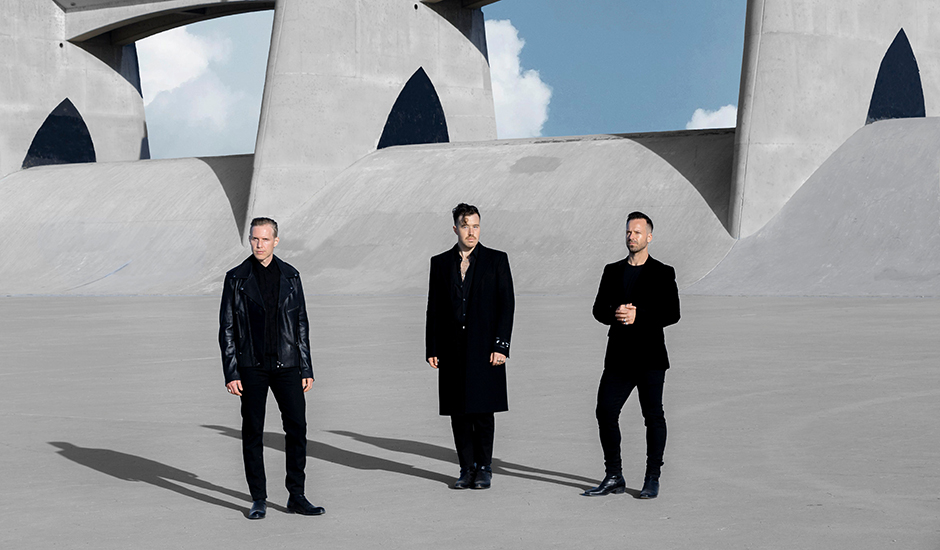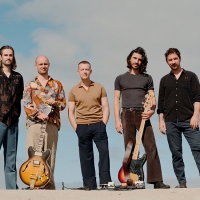 Year of the Wolf: Inside Remi Wolf’s wild, yet withdrawn worldThe Californian musician’s debut album Juno is one of 2021’s most electrifying - and most intimate - pop albums.
Year of the Wolf: Inside Remi Wolf’s wild, yet withdrawn worldThe Californian musician’s debut album Juno is one of 2021’s most electrifying - and most intimate - pop albums.

After a period of reflection, RÜFÜS DU SOL emerge all grown up
On their fourth album Surrender, the Australian exports reflect on a turbulent few years filled with new life, new experiences and new sounds.
Header image by Eliot Lee Hazel. In-article images by Eliot Lee Hazel and Donslens.
At this point in their careers, you’d think that RÜFÜS DU SOL would have everything figured out. Their new album Surrender marks their fourth full-length record (not counting two remix albums, a live album and a debut EP), and in the last few years alone, they’ve managed to launch a record label (Rose Avenue Records, featuring close friends such as Cassian and Lastlings), play almost every major music festival both locally and internationally (when they were running, that is), and further define themselves as one of Australia’s pioneering acts; an international export with devoted audiences spread throughout dance music’s many havens.
While making their last album, however, RÜFÜS DU SOL almost fell apart. “It was a pretty unhealthy period and we were neglecting a lot of things: Ourselves, our families, our friends, each other,” reflects the band’s Jon George. Solace - the final product, released in 2018 - was darker due to this emotional tension, which weaved itself into the fibres of the band’s sound. “We were channelling these raw emotions,” drummer James Hunt explained in our feature accompanying the album’s release.
When the dust surrounding Solace’s arrival eventually settled (albeit forcibly, due to the pandemic), a period of reflection and mending emerged, as they attempted to repair the wounds slashed open during Solace’s creation. When they began to write new material, they ensured that every session was a safe space, beginning with meditation and an opportunity for each member to air grievances with each other or their surrounding world. It was a time of reflective change; an opportunity for them to work out how to write a new album healthily together, no less with growing families and a global pandemic around them.
It’s from this reflection that their fourth album Surrender blooms. Released last week, Surrender depicts this journey of reflection and the often uncomfortable ways of thinking that’s spurred from it, emphasising regrets from the past just as much as it does the genuine joyfulness that comes from the other end, as RÜFÜS DU SOL emerge the other side more in-touch with themselves, each other, and their surroundings more than ever before. “We feel better than ever now,” Jon celebrates.
It’s an easy cliché, but in a lot of ways, Surrender is RÜFÜS DU SOL’s most emotional record to date. Next To Me is the most heartfelt ‘love song’ the band have ever recorded; a love letter from frontman Tyrone Lindqvist to his now-wife. The album’s title track Surrender centres itself around the idea of healing, while many of the album’s songs themselves - the leading single Alive, the album-closing Always - are depictions of the entire journey leading to Surrender’s creation, soundtracking the journey of reconnection as RÜFÜS DU SOL overcome the struggles that plagued their prior few years.
In a lot of ways, Surrender is a celebratory album. It was the healthiest album creation process of the band’s career to date, Jon admits, and the sudden abundance of pandemic-induced free time meant that the trio finally had the chance to reflect on RÜFÜS DU SOL’s toll on their lives, and how they can better craft a sense of balance between the band and their relationship as close friends for the better part of a decade, as well as their individual relationships with growing families, and a changing world around them.
In saying that, the cathartic journey that defined Surrender brought up many uncomfortable and emotional conversations, and that’s something too shown within Surrender’s subtle darker presence. It’s something that shows in the desperation of album highlight On My Knees, as Tyrone’s vocal stirs amongst one of the heavier productions of the RÜFÜS DU SOL discography: “Feels like the walls are closing in, looks like I'm on my knees again,” the song’s chorus yells. Similarly, there are traces of hardship amongst the beginnings of songs like Alive, as they navigate through RÜFÜS DU SOL’s rollercoastering last few years. “There's a pain in my chest that I can't describe, it takes me down and leaves me there / When I talk to the night, I can feel its stare, it creeps inside and meets me there,” the song opens.
Surrender is an album that carries a lot of turbulence in RÜFÜS DU SOL’s journey. It captures the storm of emotions that surrounded Solace’s creation right through to the joyfulness of repaired relationships and mended emotional connection. Now, on the other side of Surrender, RÜFÜS DU SOL are the healthiest they’ve ever been. “I think we were able to become best friends again.”


I know the process of recording Solace became quite unhealthy. How were you guys feeling coming out of the other side of it, once the album roll-out and touring begun to die down?
Yeah, it was an incredibly unhealthy period. We were neglecting a lot of things… we were neglecting close friends and partners, and we were investing too much in ourselves that we ignored our responsibilities. We weren’t being the best version of ourselves a lot of the time. It came down to a lot of things, but we did a lot of work over the last few years to try and change that, and I think this whole album process has been the healthiest we’ve had yet. It’s been so much more of a pleasure to write and stick to a routine and focus on repairing our relationships with each other and trying to be the best we can be, basically.
Was that something you guys finally had the opportunity to address seeing as touring was completely out of the equation for a long while?
Yeah, 100%. Although the pandemic has been a really shitty time for a lot of people, we’ve been able to use it to our advantage, just with the isolation and the time to try and focus on doing those repairs. We went out to Joshua Tree just when the pandemic hit, and we had about a year of touring cancelled. We just planned to go there for a couple of weeks to start the writing process, but as things locked down further and further in Los Angeles, we ended up staying out in Joshua Tree and wrote for two months.
We used that time to do some group therapy between each other. We’d start a day with meditation and a workout together, spending a bit of time to get past any resentments or anything that we were holding against each other, and just trying to be as open as we could with each other. I think we were able to become best friends again. It felt really, really important that we have this time, and we feel better than ever as a unit.
How did all of this affect the music you were writing at the time?
I think a lot of it started with being able to ask big questions. We asked more existential questions about what we wanted out of life. At the start, there was a little more regret over what we were holding against each other over the last few years, and then towards the end of the writing process, it became a bit more of a celebration of where we got, how lucky we are to be where we are, have each other as good friend friends, and be able to do what we love every day. I think that range of emotions stems throughout the record.
Solace was a bit of a turning point for the band, as the songwriting elements - the emotion of your songwriting - felt more pronounced than ever. On this album, it feels like you take it even further though. It seems like that’s something felt within the band too.
Yeah. I think we’ve really enjoyed that part of working - being open and honest and vulnerable and really playing into that. We’re in the studio being as real as we can be, and not making any superficial music. We really want it to be authentic to ourselves, and with our songwriting process now, we’re making stuff that feels like that.
You mentioned that at the beginning of Surrender’s creation process, you asked each other big questions, and got into the depths of your relationship with one another. What kind of questions were you trying to ask with this album?
For starters, right at the very beginning, we were asking whether we really want this; asking ourselves whether we can sustain a healthy lifestyle being in a global band that can be out in the world, and facing those fears of it being hard to be responsible. It’s hard to look after ourselves and each other, and I think we really worked on that, and tried to work out how we’ve done each other wrong, or how to be the best type of friends we can be to put each other in the best… musical partners we can be for each other. We wanted to have fun in the studio again, not feeling too heavy or having it being seeded with resentment.
Was there a particular spark moment where everything began to come together?
I think Alive was one of those moments right at the start of the record that felt really, really right. We wrote that one earlier on, and it was really reflective of where we were at - at least we’re alive, at least we have a house and we have these things that we can do together as best friends. It was also us starting to push this new sound, with the break-beat and the darker electronic sound. I think that really sums up a lot of the record, and I’m really proud of the rest of the tracks and how much they pushed us out of our comfort zone sometimes.
That final run of three songs - Surrender, Devotion and Always - right at the end of the record is some of the most thrilling work RÜFÜS DU SOL have ever done.
I really appreciate that. We’re really, really proud of Surrender and having the children’s choir that we recorded in Los Angeles. Then, using Curtis [Harding] from Atlanta who comes in later in the track creates this big journey throughout that felt like such a cool, different way to make music.
Was there a particular thing that drew you guys to name the entire record after Surrender?
I think it came as an album name first. We were throwing around a bunch of different album names, and Surrender seemed like something we were doing. We were surrendering, you know, being vulnerable and embracing the change and new lifestyle that we were trying to create in the process of becoming friends again. I think as we were finishing that last track, it sounded like it really summed up that feeling - having some innocence back in our lives. It felt really good.
You talked about Alive being the signature piece of the album, and the trigger point for the rest of it. How did that song inform the rest of the record?
I feel like that was a really good moment of change for us: pushing different sounds, the lyrical content, the darker body to it. I think that allowed us to let go and say that we have that now on the record, and that opened us up to have these moments of reflection; to have the rest be able to have the… going back to tracks from Bloom or Atlas, the healthy and more celebratory sound. I feel like it really allowed us to explore some of those older roots.


You guys clearly learnt a lot about yourselves and each other writing this record. What do you feel like are some of the key takeaways from the journey to Surrender?
Just having a sense of routine and being in control of our personal lives has been huge. We weren’t just writing and having an unhealthy relationship with writing. I think we established really good practice, so whenever we step into a studio now, we find a safe space where we can be vulnerable and open to one another. We still have responsibilities outside of the studio, so I feel like it was something that was really important for us to take control of. Then, we also became much better friends again, and are able to spend time together without all the pressures of live touring - being able to reconnect like that was… yeah.
It’s important to find that balance, because while RÜFÜS DU SOL is growing as a band, you guys are growing as well… like, there are kids involved now.
Exactly. We can’t afford to be irresponsible. We really have to be the best version of ourselves, and I think we’ve been getting closer to doing that.
Was there anything in particular that felt like a turning point with the band’s relationship with each other?
Spending eight weeks in Joshua Tree. Like I said, we were doing meditation and therapy between each other, and I think when we came back to LA, we really reconnected. I felt like we had gotten past a big point of our lives and that now, we were being so much more open with one another, and vulnerable and real with one another. I think that was the moment.
You talked about this album having a bit of a darker belly to it. How do you feel like the prodoction has changed between this album and Solace?
We tried a bunch more things. We went into darker electronic world with influences like Moderat and even some more Trent Reznor-y production, and trying to create a real sonic world that was pushing ourselves. We had a lot of fun doing that, and we made a lot of material, spending so much time trying different production techniques. We had a beautiful studio set-up in Hollywood; we had a piano upstairs that we recorded a lot on, and we’d put pieces of paper in between the hammers in the piano to create different feelings within the acoustic instruments. It was really fun.
Does that come with the fact that you guys are now four albums in, and there’s a need to experiment and constantly further yourselves?
Yeah, for sure. I think we’ve always wanted to do that. I think we’ve always wanted to continue being experimental, from trying different techniques to being better producers full-stop. We really stepped out of the things that we were used to, and try to push ourselves trying to do that.
There’s a lot you guys have seemed to take away from this album, whether it be in your relationships with each other and music, or through the sonic evolution. How do you feel like they’re going to remain present in your life beyond this album cycle?
We’ve set up some really good practices. How we should work, how we want to treat other, the type of people we want to be, the responsibilities we want to carry - we’ve set-up really good practices to maintain all of these over the last year. Every album is a really good snapshot of where you’re at in life, so it’s interesting that there are so many great things to come out of this record that will extend beyond that. It was a very wild time for us and now we’re feeling a lot more settled, and I feel like Surrender is a full, healing moment for us.
RÜFÜS DU SOL's new album Surrender is out now via Rose Avenue Records / Reprise Records / Warner Music Australia.
 Year of the Wolf: Inside Remi Wolf’s wild, yet withdrawn worldThe Californian musician’s debut album Juno is one of 2021’s most electrifying - and most intimate - pop albums.
Year of the Wolf: Inside Remi Wolf’s wild, yet withdrawn worldThe Californian musician’s debut album Juno is one of 2021’s most electrifying - and most intimate - pop albums.
 Mildlife: Turning a destabilising year into their most successful yetAmongst Melbourne’s 2021 lockdown, we speak to Mildlife about turning tour disappointments into their new film, Live from South Channel Island.
Mildlife: Turning a destabilising year into their most successful yetAmongst Melbourne’s 2021 lockdown, we speak to Mildlife about turning tour disappointments into their new film, Live from South Channel Island.